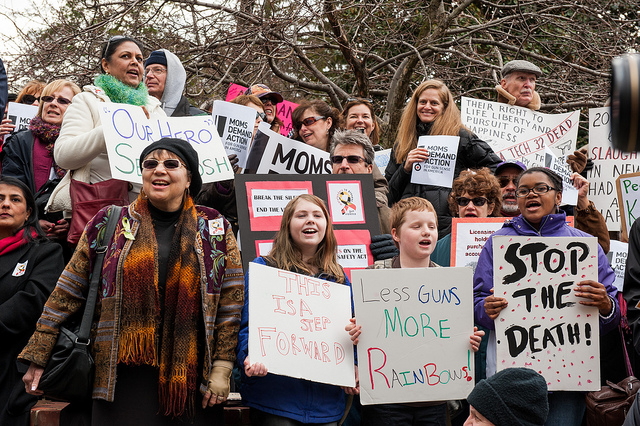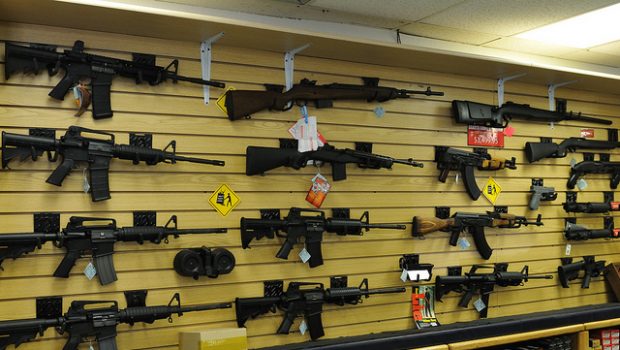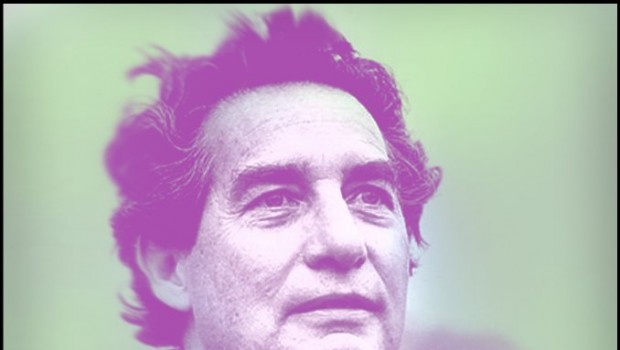Mass Shootings: Made in the USA
Los tiroteos masivos en Estados Unidos
Hélène Dieck
Every parent’s worst nightmare–a child sent to school, never to return. And the relentless question: how can a teenager with mental illness possess so many deadly weapons? For decades, the gun rights vs. gun control debate has polarized the United States. This debate resurfaces after every mass shooting, yet little has changed. When looking at the details though, the partisan divide is less than it seems.
Partisans of gun ownership believe that theirs is a constitutional right enshrined in the Second Amendment, despite scholarly debate regarding its true meaning. Indeed, the Amendment states that “A well regulated Militia, being necessary to the security of a free State, the right of the people to keep and bear Arms, shall not be infringed.” On the one hand, some believe that this sentence proclaims an individual right to bear arms. Others point to the purpose of a well-regulated militia to claim that the Framers intended to prevent giving away a State’s right to self-defense. This collective rights theory has prevailed since 1939, and the Supreme Court ruling in The United States v. Miller. However, this ruling was revoked in 2008 in favor of the individual rights theory. While the Court reaffirmed the rights of individuals to bear arms, it didn’t rule out the possibility of placing limitations on this right. For instance, the Court upheld the right to ban weapons on government property, the right to ban juveniles and convicted felons from owning a gun, and the right to enforce regulations requiring a permit to carry concealed weapons.
Some pro-gun commentators were quick to say that the root cause of the Florida mass shooting was a mental health problem, not guns. The level of mental health issues in the US is comparable to that of other developed countries in the world and yet, the United States is the most prone to mass shootings. Moreover, a study by Josh Tewksbury shows that the more guns there are in a country, the greater the likelihood of gun-related deaths. Although the United States makes up only 5 percent of the world population, almost a third of mass shootings happening on the planet take place there, according to a study by the University of Alabama. There have been 1,600 mass shootings since the Sandy Hook Elementary School massacre in 2012, resulting in 1,800 deaths and 6,500 wounded (Gun Violence Archive). Data from the Institute for Health Metrics and Evaluation shows that a U.S. citizen is 8 times more likely to die of gun violence than Canadians, and 27 times more likely than Danish people (this data excludes deaths from armed conflicts, accidents, or self-inflicted wounds). Mass shootings are very much an American phenomenon, made possible by relaxed gun laws. In 1999, a UC Berkeley comparison between crime in London and in New York showed that the United States has comparatively less crime, but this crime is more likely to end up with lethal violence than its counterpart because of the availability of guns. A review of 130 studies in 10 different countries by Epidemiologic Reviews in 2016 showed a correlation between new gun control laws and a drop in gun violence.
At the same time, the same research center also points that most Americans believe these same laws would prevent them from protecting their homes and family and would give the government too much power over an individual. Indeed, while half of gun owners cited hunting as the main reason to own a gun 20 years ago, most gun owners today cite protection as their main motive. Despite the increasing number of mass shootings, these trends are accentuating over the years. Also accentuating is the partisan divide over the issue. While only 29 percent of Republicans sustain that stricter laws would reduce the number of deaths resulting from mass shootings, more than 70 percent of Democrats support this statement. More and more Republicans also believe that stricter gun laws will lead to taking guns away altogether. Overall, 74 percent of Republicans are in favor of gun rights compared to 22 percent of Democrats, as opposed to 45 percent and 25 percent, respectively, twenty years ago. A Pew Research Center study before and after the mass shootings in Aurora, Tucson, and Virginia Tech further shows that these mass shootings do not change people’s views on gun control vs gun rights.

Rally to Prevent Gun Violence Rally to Prevent Gun Violence. by Jay Baker at Annapolis, MD
The results are significantly different, however, when people are asked about specific gun regulations. Most Americans agree with new legislation requiring broader background checks and banning military style weapons. In the wake of the Florida massacre, an NPR/Ipsos poll that 91 percent of Democrats and 70 percent of Republicans favor banning assault-style weapons altogether. A Pew Research Center Poll conducted last year showed that 89 percent of Americans were in favor of preventing people with mental illnesses from buying guns, that 84 percent favored background checks for private gun sales, while 83 percent agreed to ban sales of weapons to persons on no-fly or watch lists. A Gallup poll shows that the portion of Americans hoping for stricter gun laws rose from 32 percent in 2003 to 46 percent in 2018. For the past three years, most Americans believe gun sales should be more regulated.
Then, why are the political leaders not enacting the gun control measures that most Americans want? President Trump was one of the first to recognize that the Douglas High School shooter was mentally ill. Yet during his first month in office, President Trump revoked the Obama-era bill preventing the 75,000 U.S. citizens too mentally ill to handle their own health benefits from acquiring guns. This repeal was supported by the National Rifle Association, the ACLU, a prominent civil-rights organization, and mental health advocacy organizations. After the Florida massacre, some Congressional leaders didn’t dismiss the possibility of revisiting this legislation. For instance, Paul Ryan, the Republican Speaker of the House, stated that “if someone who is mentally ill is slipping through the cracks and getting a gun, because we have laws on the books—we have a system to prevent people who aren’t supposed to get guns from getting guns—and if there are gaps there, then we need to look at those gaps.” However, any calls for action are usually unfruitful. For instance, the massacre during which 58 people were killed in Las Vegas last October drew momentum for banning bump fire stocks, an accessory that allows to a rifle to be fired like an automatic weapon and contributed to the gunman perpetuating the most deadly massacre in U.S. history. Yet so far, the proposed legislation has not been adopted. In the wake of the mass shooting in Newton, Connecticut a bill requiring background checks reached the Senate, yet after the NRA lobbying campaign, the vote was 56 votes in favor: not enough to override the filibuster.
The answer may lie in the salience of the issue for the American voter. Gallup polls also show that a quarter of American voters would only vote for a political candidate who shares their view on gun laws. Lobbyists such as the NRA are quick to make them believe that any legislation restricting gun ownership is the beginning of the end of their constitutional right to protect themselves. Pro-gun proponents are, therefore, less vocal about their political views, offering only their thoughts and prayers after a mass shooting while the NRA waits out the storm.
*Cover image by Michael Saechang
 Hélène Dieck received her PhD from Sciences Po, Paris, France. She was previously responsible for elaborating military doctrine at the French Ministry of Defense and served as a visiting researcher at the RAND Corporation, Washington, DC. She currently works as a migrant welfare specialist at Qatar Foundation and recently publishedThe Influence of Public Opinion on Post Cold War U.S. Military Interventions (Palgrave, 2015).
Hélène Dieck received her PhD from Sciences Po, Paris, France. She was previously responsible for elaborating military doctrine at the French Ministry of Defense and served as a visiting researcher at the RAND Corporation, Washington, DC. She currently works as a migrant welfare specialist at Qatar Foundation and recently publishedThe Influence of Public Opinion on Post Cold War U.S. Military Interventions (Palgrave, 2015).
©LiteralPublishing
La peor pesadilla de todas las madres es mandar un hijo a la escuela y que nunca regrese. Lo que nos lleva a una pregunta implacable: ¿cómo un adolescente que no está bien de la cabeza puede poseer tantas armas mortales? Durante décadas, el debate sobre el derecho de posesión de armas vs el control de armas ha polarizado a los Estados Unidos. Este debate vuelve a surgir después de cada tiroteo en masa que se lleva a cabo en el país; sin embargo, los cambios que logra son muy pocos. Cuando analizamos los detalles de este fenómeno, la división partidista es menor de lo que parece.
Los partidarios de la posesión de armas creen que este es un derecho constitucional consagrado en la Segunda Enmienda, a pesar del debate académico que estudia su verdadero significado. De hecho, la Enmienda establece que: “Una milicia bien regulada, siendo necesaria para la seguridad de un Estado libre, el derecho de las personas a mantener y portar armas, no será vulnerado”. Por un lado, algunos estudiosos creen que esta frase proclama un derecho individual a portar armas. Por otro lado, otros estudiosos señalan la intención de una milicia bien regulada de afirmar que los fundadores tenían la intención de no ceder el derecho a la propia defensa de su país. Esta teoría de los derechos colectivos se estableció desde 1939. Sin embargo, este fallo fue revocado en 2008 a favor de la teoría del derecho individual. Si bien la Corte reafirmó los derechos de las personas a portar armas, no descartó la posibilidad de poner limitaciones a este derecho. Por ejemplo, la Corte confirmó el derecho a prohibir las armas dentro de las propiedades del gobierno, el derecho a prohibir que los delincuentes juveniles y convictos posean un arma, y el derecho a hacer cumplir las reglamentaciones que requieren un permiso para portar armas ocultas.
Algunos comentaristas a favor de las armas se apresuraron a decir que la causa principal del tiroteo masivo en Florida fue la salud mental y no las armas de fuego. El problemas de salud mental en los EE. UU. es comparable al de otros países desarrollados en el mundo; sin embargo, los Estados Unidos son los más propensos a los tiroteos masivos. Además, un estudio de Josh Tewksbury muestra que cuanto más armas hay en un país, mayor es la probabilidad de muertes relacionadas con armas de fuego. Aunque Estados Unidos constituye solo el 5 por ciento de la población mundial, un tercio de los tiroteos masivos que ocurren en el planeta tienen lugar en los Estados Unidos, según un estudio de la Universidad de Alabama. Han sucedido 1,600 tiroteos masivos desde la masacre en la Escuela Primaria Sandy Hook, resultando en 1,800 muertes y 6,500 heridos (Archivo de Violencia de Armas). Datos del Institute for Health Metrics and Evaluation muestran que un ciudadano estadounidense tiene 8 veces más probabilidades de morir a manos de la violencia con armas que los canadienses, y 27 más que los habitantes de Dinamarca (estos datos excluyen muertes por conflictos armados, accidentes o muertes autoinfligidas). Los tiroteos masivos son en gran medida un fenómeno estadounidense, posibles debido a unas leyes de armas demasiado permisivas. En 1999, una comparación de la UC Berkeley entre el crimen en Londres y en Nueva York mostró que Estados Unidos tiene menos crímenes, pero es más probable que los crímenes cometidos sean letales debido a la enorme oferta y disponibilidad de armas. Una revisión de 130 estudios en 10 países diferentes realizada por Epidemiologic Reviews en 2016, mostró una relación muy estrecha entre las leyes de control de armas y la disminución de la violencia con armas de fuego.
Veinte años de investigación del Pew Research Center muestran que la mayoría de los estadounidenses cree que las leyes de armas estrictas reducirían el número de muertes que resultan de tiroteos masivos. Al mismo tiempo, el mismo centro de investigación también señala que la mayoría de los estadounidenses cree que estas mismas leyes evitarían que puedan proteger sus hogares y su familia dándole al gobierno demasiado poder sobre un individuo. De hecho, mientras que la mitad de los propietarios de armas apuntalaron la cacería como la razón principal para poseer un arma hace 20 años, la mayoría de los propietarios de armas hoy dicen que el motivo principal por el cuál tienen armas es para su protección. A pesar del creciente número de tiroteos en masa, estas tendencias se acentúan a lo largo de los años. Asimismo se acentúa la división partidista sobre el tema. Mientras que solo el 29 por ciento de los republicanos cree que las leyes más estrictas reducirían el número de muertes resultantes de tiroteos masivos, más del 70 por ciento de los demócratas cree en esta declaración. Los republicanos, cada vez más, creen que la restricción en las leyes llevarían a eliminar todas las armas. En general, el 74 por ciento de los republicanos están a favor de los derechos a portar armas, en comparación con el 22 por ciento de los demócratas. Hace 20 años, sin embargo, el 45 por ciento de los republicanos se postulaba a favor de la portación de armadas contra el 25 por ciento de los demócratas. Un estudio del Pew Research Center antes y después de los tiroteos masivos en Aurora, Tucson y Virginia Tech muestra además que estos tiroteos masivos no cambian las opiniones de las personas sobre el control de armas y su derecho a portarlas.

Rally to Prevent Gun Violence Rally to Prevent Gun Violence. by Jay Baker at Annapolis, MD
Los resultados son significativamente diferentes cuando la pregunta se refiere a la regulación de ciertas armas específicas. La mayoría de los estadounidenses están de acuerdo con la nueva legislación que exige controles de antecedentes más amplios y la prohibición de armas de estilo militar. A raíz de la masacre de Florida, una encuesta de NPR / Ipsos afirma que el 91 por ciento de los demócratas y el 70 por ciento de los republicanos están a favor de prohibir por completo las armas de asalto. Una encuesta del Pew Research Center realizada el año pasado mostró que el 89 por ciento de los estadounidenses estaba a favor de evitar que personas con enfermedades mentales compraran armas, el 84 por ciento prefería verificaciones de antecedentes para ventas de armas privadas y el 83 por ciento acordó prohibir la venta de armas a personas que están dentro de las listas que exigen más vigilancia sobre los individuos y que se les prohíbe volar. Una encuesta de Gallup muestra que la porción de estadounidenses que esperaban leyes de armas más estrictas aumentó del 32 por ciento en 2003 al 46 por ciento en 2018. En los últimos tres años, la mayoría de los estadounidenses cree que las ventas de armas deberían ser más estrictas.
Entonces, ¿por qué los líderes políticos no están promulgando las medidas de control de armas que la mayoría de los estadounidenses quieren? El presidente Trump fue uno de los primeros en reconocer que el tirador de la escuela Douglas High estaba mentalmente enfermo. Sin embargo, durante su primer mes en el cargo, el presidente Trump revocó el proyecto de ley de la era de Obama que impedía que los 75,000 ciudadanos estadounidenses con enfermedades mentales adquirieran armas de fuego. Esta derogación fue apoyada por la Asociación Nacional del Rifle, la ACLU, una prominente organización de derechos civiles y organizaciones de defensa de la salud mental. Después de la masacre de Florida, algunos líderes del Congreso no descartaron la posibilidad de revisar esta legislación. Por ejemplo, Paul Ryan, presidente republicano de la Cámara de Representantes, declaró que “si alguien mentalmente enfermo se está escapando por las grietas y obteniendo armas tenemos que poner atención a esas brechas”. Sin embargo, este llamado a la acción generalmente es infructuoso. Por ejemplo, la masacre en Las Vegas en octubre pasado, que mató a 58 personas (la masacre más mortífera en la historia de Estados Unidos), generó una propuesta para prohibir un accesorio que permite que una arma no automática dispare como tal. Sin embargo, hasta ahora, la legislación propuesta no ha sido adoptada. A raíz del tiroteo masivo en Newton, Connecticut, un proyecto de ley que requería verificación de antecedentes llegó al Senado, pero después de la campaña de cabildeo de la NRA, el voto fue de 56 a favor, un número insuficiente como para pasar la ley.
La respuesta podría encontrarse en la importancia del tema para el votante estadounidense. Las encuestas de Gallup muestran que una cuarta parte de los votantes estadounidenses solo votaría por el candidato político que compartiría su opinión en cuanto a las leyes de armas se refiere. Los grupos poderosos como la NRA son muy hábiles para hacerles creer que una sola legislación que restrinja la posesión de armas es el principio del fin de su derecho constitucional a protegerse. Los defensores de las armas, por su parte, se inclinan menos a expresar sus puntos de vista políticos, ofreciendo siempre sus oraciones después de un tiroteo masivo mientras la NRA continua aplazando la tormenta.
*Imagen de portada: Michael Saechang
 Helene Dieck escritora y periodista. Ha sido la responsable de elaborar la doctrina militar de Ministerio de Defensa Francés e investigadora visitante del RAND Corporation, Washington, DC. Actualmente trabaja en el Qatar Foundation. Su libro se titula The Influence of Public Opinion on Post Cold War U.S. Military Interventions (Palgrave, 2015).
Helene Dieck escritora y periodista. Ha sido la responsable de elaborar la doctrina militar de Ministerio de Defensa Francés e investigadora visitante del RAND Corporation, Washington, DC. Actualmente trabaja en el Qatar Foundation. Su libro se titula The Influence of Public Opinion on Post Cold War U.S. Military Interventions (Palgrave, 2015).
©Literal Publishing. Queda prohibida la reproducción total o parcial de esta publicación. Toda forma de utilización no autorizada será perseguida con lo establecido en la ley federal del derecho de autor.










